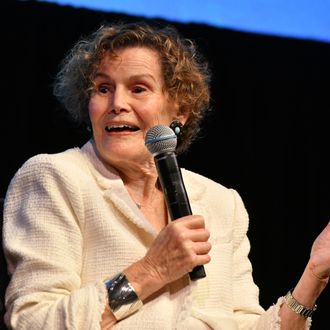
Gathered in Midtown for the annual New Yorker Festival, the literati agreed on two things: (1) more horny books, and (2) sex scenes in books, like onscreen, are changing.
It started Saturday early afternoon when New Yorker staff writer Naomi Fry led a chat with Judy Blume and Curtis Sittenfeld, who had a lot to say about sex scenes, intimacy in fiction, and imagining politicians fucking.
The discussion covered all of Blume’s greatest hits, including Are You There, God? It’s Me, Margaret, the Fudge books, and Forever. Blume, 85, explained the genesis of the latter (often banned) novel. One day, her daughter asked: “Couldn’t there be a book where two nice kids do it and nobody has to die?”
“Girls were punished for being sexual beings,” Blume said.
Blume loves writing sex scenes. “I used to know that they were good if I turned myself on while I was writing them. … now that doesn’t happen as much.”
Sittenfeld was also pro-sex scene, sharing what she termed her “unpopular opinion” on the subject: “I think writing fiction about real political figures in which they have sex is a good idea…but sometimes I don’t even agree with myself.” (Sittenfeld is the author of the novels Rodham, which fictionalized Hillary Clinton’s life, and American Wife, about Laura Bush.)
“You have great sex scenes between those politicians!” Blume replied. “It’s all fiction. It has to be because you weren’t there. And I love what you imagine!”
Recently, the sex scene has become fodder for cultural critics. Last year the New Yorker hosted a conversation about the dearth of sex in film. (See also: Vulture’s erotic thrillers week.)
Sex also came up at the conversation between Mary Gaitskill and Emma Cline moderated by Molly Fischer, later that afternoon. Their wide-ranging discussion touched on Gaitskill’s fascination with hell, the texture of moss, Iceland, and their shared admiration for John Cheever’s short stories (“The Swimmer” loosely inspired the ending of Cline’s The Guest). Fischer asked them if “sex is at the core of how you understand personality.” “Yeah,” Gaitskill said plainly, to a few knots of laughter.
For Gaitskill, there’s an interesting tension built into sexual expression. Desire is raw and overpowering, but it has to channel itself in a prosocial way and interact with other facets of one’s personality. “It’s potentially very destructive,” she said, “but also the best thing in the world, really. I don’t just mean the act itself but the human connection with something that powerful.”
Over the years, her students’ stories — once saturated with sex — got more cautious. “When I first started teaching in the ’90s, I was flabbergasted that in mixed-gender classes, people would write the most pornographic things. Like, practically porn, sometimes. And quite violent sometimes. I stopped teaching about a year ago, but in the years leading up, I noticed a change. … perhaps there was sexual overkill.” But fiction doesn’t have to include sex, she said. “Depends on the person… You can write very strongly about feelings and relationships without being graphic.”

